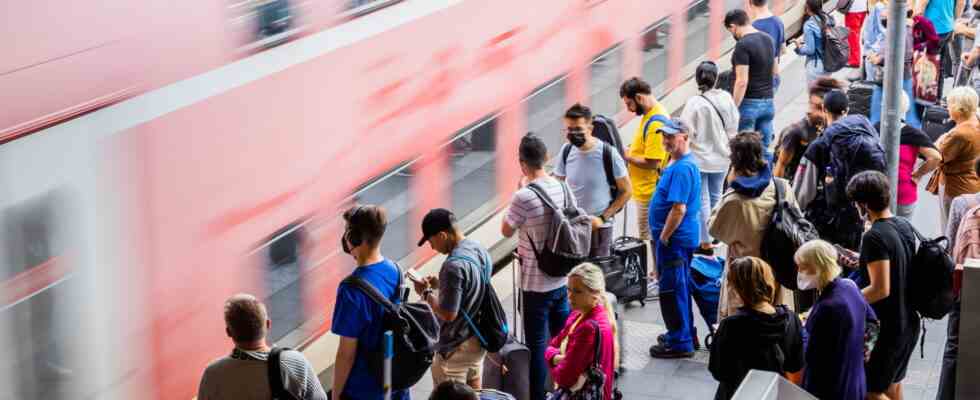Status: 11/17/2022 11:12 a.m
With local public transport across the country for 49 euros per month: the Deutschlandticket is to come in January. A step towards the mobility of the future? Experts are skeptical.
The goals are clear: Politicians hope that the introduction of the Deutschlandticket will relieve consumers’ wallets on the one hand and make it easier to switch from the car to public transport on the other. “Right from the start, we have been working towards our long-term goal of a cheap, universally valid ticket for everyone,” says the Hessian Transport Minister Tarek Al-Wazir. “With the Deutschlandticket it has now been achieved.”
The federal and state governments will finance the ticket together. 1.5 billion euros flow into the project each year. The federal government will also permanently provide more money for public transport, namely another billion euros. The federal government is currently paying €9.4 billion in regionalization funds. The federal states use this money, for example, to order buses and trains from the transport companies.
“The change must be attractive”
For Al-Wazir, the higher regionalization funds are a success. Without the additional billion, the Germany ticket would be ineffective. “Equally important as affordable and simple tariffs is an efficient public transport offer. The change must be attractive. The best ticket is useless if the bus doesn’t come anymore.”
Steffen Müller, Managing Director of the North Hessian Transport Association (NVV), which operates around Kassel, also welcomes the introduction of the ticket. Nevertheless, he would have liked more time for implementation. January is the preferred start date for politicians, but this cannot be guaranteed, according to the NVV managing director. All tariffs would have to be lowered and subsidized. “We have a calculation in our income, which is of course based on the fact that we have the old prices. We have to change everything now.” The Association of German Transport Companies also considers an introduction to be more realistic on March 1st.
Complex implementation and open questions
The overall financing of bus and train is still not sufficient, says Müller. Even if the managing director of the NVV initially assumes that the capacities of his transport company will be sufficient. Although one saw partially overcrowded trains in the summer due to the 9-euro ticket, the ticket is now more expensive, so that the new edition will probably be used a little less. Nevertheless, the Germany ticket must be made even more usable, especially in rural areas. People in rural areas should continue to be the focus.
Mobility expert Jürgen Follmann also welcomes the fact that there will be a permanent ticket model for the whole of Germany in the future. As Dean of the Department of Civil and Environmental Engineering, the professor at Darmstadt University of Applied Sciences has been dealing with the topic of mobility for years. For him, the ticket is not the end. A multi-level system is needed because there are still many people who cannot afford 49 euros a month. In addition, one should not ignore people who are currently driving with special tickets, such as schoolchildren, students, senior citizens and state employees.
More is needed for the traffic turnaround
According to the mobility expert, the Deutschlandticket alone will not bring about a turnaround in traffic. Public transport is just one side. On the other hand, you have to get people to walk or use their bikes more. For Follmann, it’s all about the mobility of the future as a complete package. New structures are needed and perhaps also systems that can quickly overcome borders.
Boundaries such as rivers, motorways or rail routes could be overcome in urban areas, for example by cable cars, according to the idea of his students. He supports this idea, which has already been the subject of political debate: “From our point of view, the advantage today would be that it could probably be realized more quickly than a rail line, certainly faster than an S-Bahn line or an underground line.”

